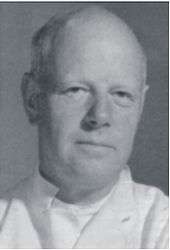Herbert Olivecrona
Axel Herbert Olivecrona (July 11, 1891 – January 1980) was a Swedish professor and brain surgeon, credited with founding the field of Swedish neurosurgery,[1] and pioneering developments in modern neurosurgery.

Family, early life and education
Herbert Olivecrona was born July 11, 1891 in Visby, Sweden, the son of Axel Olivecrona, a district court judge, and Countess Ebba Cristina Mörner af Morlanda. His brother Karl Olivecrona was a noted Swedish legal scholar, and his son Gustaf Olivecrona a Swedish writer and journalist.[2]
In his youth, he was playing elite bandy. He was part of the IFK Uppsala bandy team which in 1912 played a draw in the final against Djurgårdens IF and shared the Swedish championship that year.[3]
Originally attending school in Uppsala, he began studying medicine at the University of Uppsala in 1909, then transferring to Karolinska Institutet, where he was an assistant in Pathology. He graduated in 1918.[2]
Medical career
In 1919, Olivecrona received a fellowship from the American-Scandinavian Foundation. This allowed him to engage in experimental work at the Johns Hopkins Institute in Baltimore, Maryland, where he worked with surgery pioneer Harvey Cushing (1869–1939). Olivecrona was offered a residency, and to be Cushing's foreign assistant on the condition that he work for a year at Pierre Marie's clinic in Paris. Due to financial reasons, Olivecrona declined and returned to Sweden, where, as the only neurosurgeon in the city interested in brain tumors, he established the first neurosurgery program at Serafimer Hospital in the 1920s.[4] After further consultation with Cushing, Olivecrona improved his skills, and in 1930 was promoted to the position of assistant surgeon in chief, allowing him to establish a 50-bed neurosurgery department.[2]
In 1935, he became the first professor of neurosurgery at the Karolinska Institute, quite likely the first chair of neurosurgery in all of Europe.[2] Olivecrona was a pioneer in the creation of specific surgical techniques for certain types of brain lesions such as acoustic neuromas, arteriovenous malformations, and berry aneurysms, becoming one of the key neurosurgical instructors in Europe.[5] One of his students, Lars Leksell (1907–1986), went on to make major advances in the development of echoencephalography, and is credited with the invention of radiosurgery.[6]
Among his most famous patients was the Hungarian writer Frigyes Karinthy, whose brain tumor he operated on in 1936. Karinthy put it into a novel titled "A Journey Round my Skull."
In 1955, Olivecrona was elected as a member of the Royal Swedish Academy of Sciences. He retired from the Karolinska in 1960 and went into private practice, during which time he also accepted an invitation to travel to Cairo and establish a neurosurgical unit in Egypt. He later co-wrote a neurosurgical handbook, Handbuch der Neurochirugie.[2] Olivecrona died in January 1980.[7]
Legacy
The Herbert Olivecrona Award, also known as the "Nobel Prize of Neurosurgery", is awarded annually by the Karolinska Institute to a neurosurgeon or neuroscientist who has made an outstanding contribution to the neurosurgical field.[8][9]
Recipients of the Herbert Olivecrona Award by year:[10]
- John F. Mullan, 1976
- Charles G. Drake, 1977
- M Gazi Yasargil, 1978
- Leonard I Malis, 1979
- Lindsay Symon, 1980
- Charles B. Wilson, 1982
- Peter J. Jannetta, 1983
- Kenichiro Sugita, 1984
- John A. Jane, 1985
- Majid Samii, 1987
- William H. Sweet, 1989
- Graham Teasdale, 1991
- Keiji Sano, 1992
- Emil Pasztor, 1993
- Alan Crockard, 1995
- Vinko Dolenc, 1996
- Takanori Fukushima, 1997
- Michael Apuzzo, 1998
- Robert F. Spetzler, 1999
- Albert Rhoton Jr., 2000
- Patrick J. Kelly, 2001
- Nicolas de Tribolet, 2002
- Matti Vapalahti, 2003
- Alexander N. Konovalov, 2004
- Björn Meyerson, 2005
- Niels-Aage Svendgaard, 2005
- Cornelius A. F. Tulleken, 2006
- Ross M. Bullock, 2007
- Bernard George, 2008
- Michael Fehlings, 2009
- Hugues Duffau (fr), 2010
- Ossama al-Mefty, 2011
- Andres Lozano, 2012
- Marianne Juhler, 2013
- Peter J.A. Hutchinson, 2015
- P. David Adelson, 2016
- L. Dade Lunsford, 2017
- Ali Fadl Krisht, 2019
Selected works
- An experimental study of the circulatory failure in peritonitis (Academical treatise), 1922
- Congenital arteriovenous aneurysms of the carotid and vertebral arterial systems, 1957
References
- Ljunggren, Bengt (January 1993). "Herbert Olivecrona: founder of Swedish neurosurgery". Journal of Neurosurgery. NCBI. 78 (1): 142–149. doi:10.3171/jns.1993.78.1.0142. PMID 8416233.
- "Herbert Olivecrona, MD". The Society of Neurological Surgeons. 2008. Archived from the original on September 24, 2015. Retrieved May 7, 2012.
- Claes-G Bengtsson (17 March 2012). "SM-finalen 17 mars 1912 – ännu offulbordat 100-årsjubileum" (in Swedish). Swedish Bandy Association. Archived from the original on 2 May 2014. Retrieved 30 April 2014.
- Horwitz, NH (1998). "Herbert Olivecrona 1891-1980". Neurosurgery.
- Lindquist, Christer; Kihlström, Lars (November 1996). "Department of Neurosurgery, Karolinska Institute: 60 Years". Neurosurgery. 39 (5): 1016–1021. doi:10.1227/00006123-199611000-00026.
- Salford, Leif (2012). "The development of echoencephalography in Sweden". In Eklof, Bo; Lindstrom, Kjell; Persson, Stig (eds.). Ultrasound in clinical diagnosis. Oxford University Press. ISBN 978-0-199-60207-0.
- "Honored Guests – Herbert Olivecrona". Congress of Neurological Surgeons. Retrieved May 7, 2012.
- "Neurosurgeon awarded top prize in his field". University Health Network. Archived from the original on January 15, 2013. Retrieved May 6, 2012.
- "Olivecrona Lecturers" (pdf). Karolinska Institutet. 2011. Retrieved May 6, 2012.
- "Dr. Ossama Al-Mefty receives the Olivecrona medal". neurosurgic.com. Retrieved May 6, 2012.
- Runeberg
- Sveriges dödbok 1947-2006, (CD-rom), Sveriges Släktforskarförbund